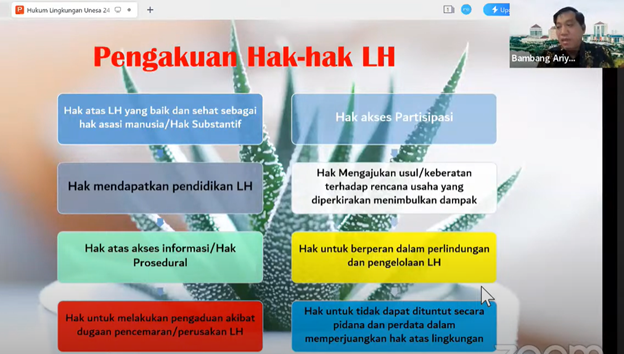
Bambang Ariyanto, UHT Surabaya law lecturer delivered material on Environmental Law in the UNESA KSDAL Guest Lecture.
Unesa. ac.id., SURABAYA— Environmental issues continue to emerge with various challenges. Air pollution, as well as forest and environmental damage caused by company and industrial activities were important highlights in the KSDAL (Natural and Environmental Resources Conservation) Guest Lecture, Department of Biology, Faculty of Mathematics and Natural Sciences (FMIPA) UNESA on Saturday (25/5/2024 ).
In the online guest lecture with the theme "Environmental Legal Regulation", Bambang Ariyanto, S.H., M.H. CMC., CCD., Law Lecturer at Hang Tuah University (UHT) Surabaya, said that there are five environmental challenges this year, namely global warming, deforestation, loss of biodiversity, plastic waste and land degradation.
"Challenges "This is mixed based on this year's problems. Every year, the challenges are different," he said. Environmental issues are of concern to many groups, including young people. Based on the Populix Survey, there is a strong desire among young people for the new president to make efforts towards the environment.
"The issue of pollution is a dominant issue. Apart from that, waste management, anticipating floods, forest fires, land damage, climate change , water pollution and marine pollution," he explained.
Biodiversity disruption is also an important environmental issue this year. This happened in East Java. He gave an example, natural apple production in Batu and Malang has decreased in the last 10 years.
From initially being at 62 tons per hectare, it has dropped to an average of between 10-15 tons per hectare. The cause is weather and temperature conditions which hinder the development of apple plants.
Does this condition make people environmentally conscious? It turns out it's not easy. According to him, it requires the role and responsibility of all parties, society, government and stakeholders to overcome this.
In the legal context, there are several types of international convention law that regulate environmental matters. First, soft law is a form of international law that does not directly bind countries. Second, the form of international law that is binding on participating countries.
Third, the choice of law, with the soft law model, non-state entities can play a further role in developing international environmental law.
Environmental law provide recognition of rights, such as the right to a good and healthy environment as a human right or substantive right, the right to access participation, and the right to receive environmental education.
Apart from that, there is also the right to play a role in environmental protection and management, the right cannot be sued, the right to access information, and the right to make complaints due to suspected environmental pollution or damage.
Business actors are obliged to maintain the preservation of environmental functions and control pollution or environmental damage . They are also obliged to provide information related to environmental protection and management correctly and accurately, and are obliged to maintain environmental sustainability and comply with the provisions of environmental quality standards.
In this activity which was attended by students from the Department of Biology, S- 1 Biology, Dr. Sunu Kuntjoro, S.Si., M.Si., hopes that with this activity students will understand environmental law. This is important, because humans cannot live without the support of nature.
The relationship between humans and nature sometimes creates an unbalanced relationship that tends to be exploitative. Therefore, regulations are needed to protect nature or natural resources in the future. "It is hoped that students who teach KSDAL courses will gain additional knowledge and be able to apply and comply with environmental laws in Indonesia," he said.
This activity was also attended by the Director of Educational Transformation and Learning Technology, Dean and Deputy Dean of FMIPA, Coordinating Study Program S -1 Biology Education, Biology Master's Program Coordinator, and lecturers in the Biology Department.[]
***
Reporter: Lina Lubabatul Karimah (FBS)
Editor: @zam
Photo: Documentation of the Team of the Directorate of Public Relations and Public Information
Share It On:






